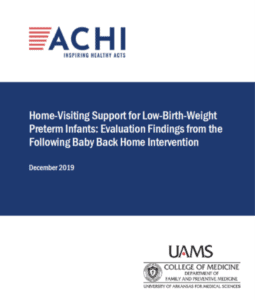Overview
Infants born preterm and with a Low Birth Weight (LBW) have a greater risk for long-term health issues than infants who are born full-term. To reduce that risk and foster better health outcomes, the Following Baby Back Home (FBBH) program offers families of these infants additional support after their discharge from the Neonatal Intensive Care Unit (NICU) through health-centered home visiting services.
Home Visiting for NICU Graduates: Impacts of Following Baby Back Home
The Following Baby Back Home (FBBH) home visiting program supports families of high-risk low birth weight preterm infants after discharge from a hospital NICU. This study compares the health care use, immunization, and infant mortality rate of low birth weight preterm infants enrolled in FBBH with similar infants not in the program. From January 2013 to December 2017, 498 children enrolled in FBBH were identified in Arkansas vital statistics records and the Arkansas All-Payer Claims Database. Infants in FBBH were matched with children in a control group on the basis of demographics and medical conditions of the infant. Generalized linear mixed models with double propensity-score adjustment were used to estimate program effects. In the first year after discharge and compared with a propensity-score matched cohort of control infants, those enrolled in FBBH were significantly more likely to have higher numbers of medical appointments and more compliant immunization history. The odds of dying in the first year of life for control infants was 4.4 times (95% confidence interval: 1.2–20.7) higher than those managed in the program. A goal of the FBBH home visiting program is to work with parents to educate and support them as they care for their medically fragile infants. We conclude that education and support was instrumental in the infant health care use and outcome differences we observed during the first year of life.
Report Description
This evaluation demonstrates that infants enrolled in FBBH receive more of their suggested childhood vaccinations and have a lower mortality rate than similar infants (matched control group) who are not enrolled in FBBH.

